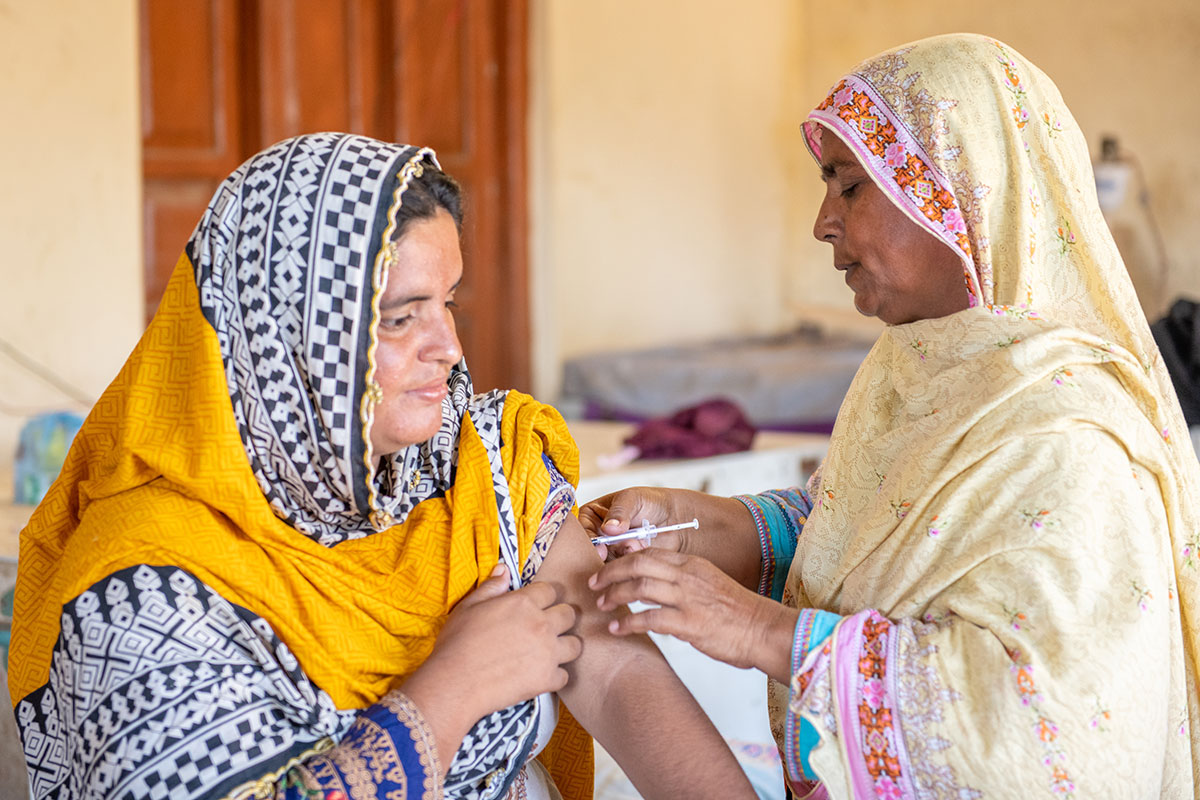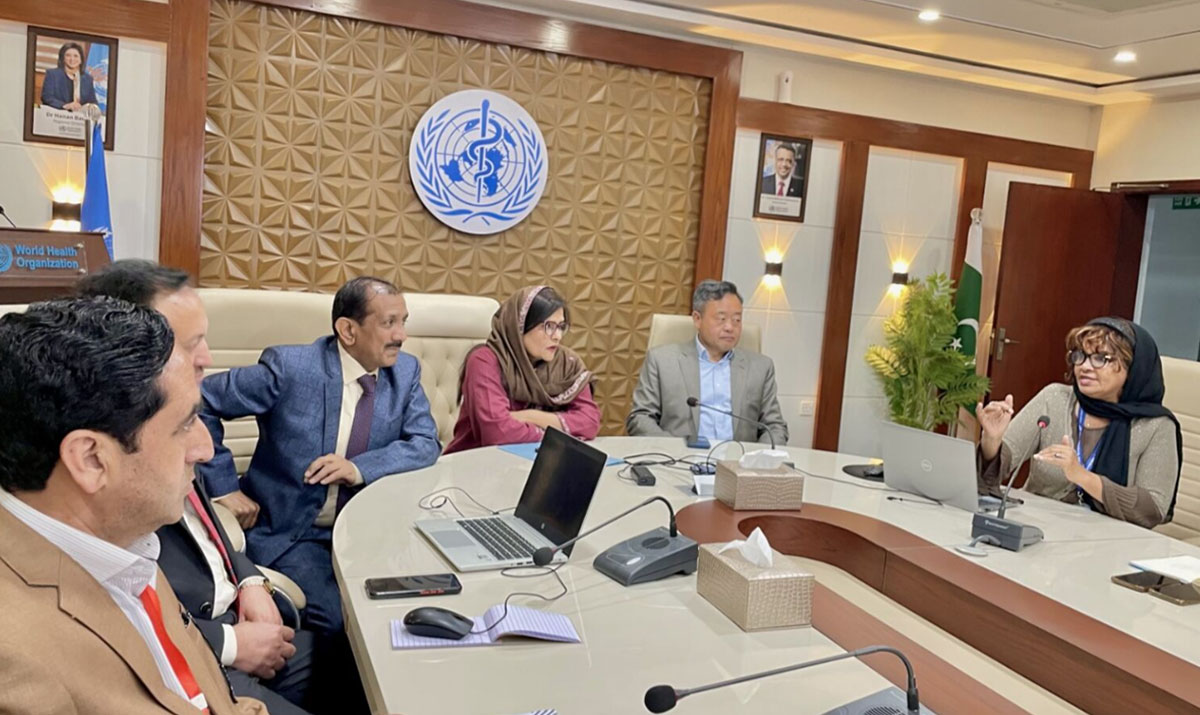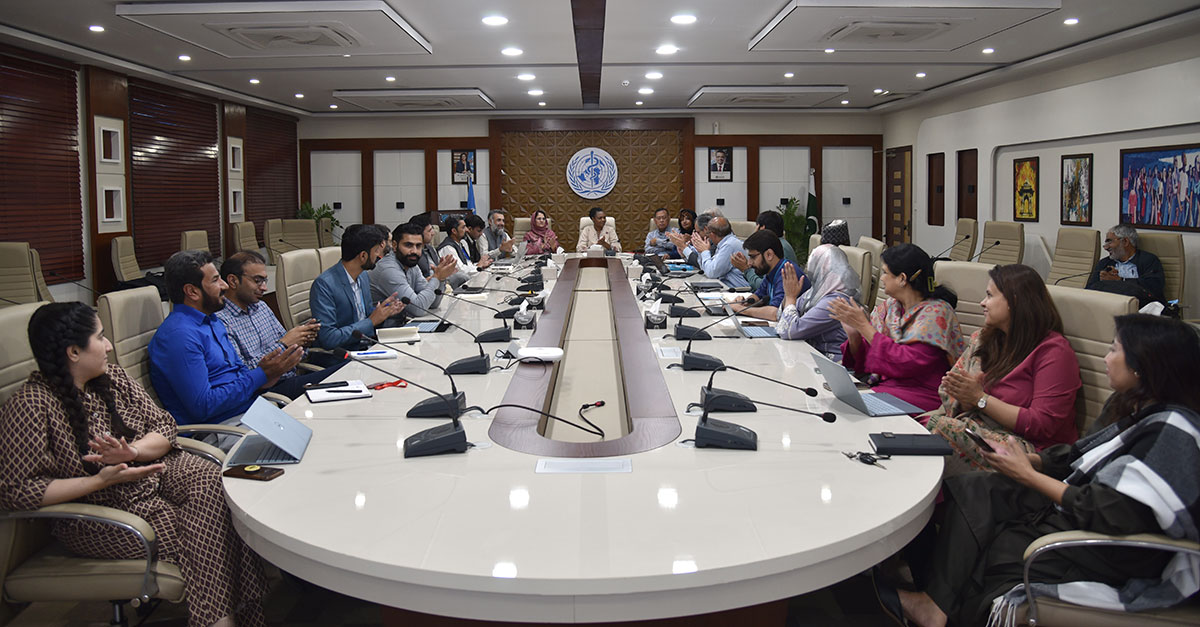 A lady health worker administering a tetanus-diphtheria vaccine to a pregnant woman in a remote area of Pakistan. Photo credit: WHO Pakistan20 March 2025, Islamabad, Pakistan – Islamabad Capital Territory (ICT) and Pakistan-Administered Kashmir (PAK) have achieved the elimination of maternal and neonatal tetanus (MNT), taking Pakistan closer to interrupting the transmission of this life-threatening disease for mothers and newborns nationwide. The validations were confirmed by the World Health Organization (WHO) following a weeklong final review led by WHO and UNICEF at the request of the Federal Government.
A lady health worker administering a tetanus-diphtheria vaccine to a pregnant woman in a remote area of Pakistan. Photo credit: WHO Pakistan20 March 2025, Islamabad, Pakistan – Islamabad Capital Territory (ICT) and Pakistan-Administered Kashmir (PAK) have achieved the elimination of maternal and neonatal tetanus (MNT), taking Pakistan closer to interrupting the transmission of this life-threatening disease for mothers and newborns nationwide. The validations were confirmed by the World Health Organization (WHO) following a weeklong final review led by WHO and UNICEF at the request of the Federal Government.
Around 80 per cent of Pakistan’s population (190 million people) now live in areas where the spread of neonatal tetanus remains under controlled limits – less than 1 case of tetanus per 1000 live births. Sindh recently achieved elimination in December 2024, while Punjab graduated in 2016.
“This milestone not only reflects the strength of our immunization strategies and the diligence of our frontline workers but also serves as a benchmark for the entire nation,” said Director General, Ministry of National Health Services, and Director of the Federal Directorate of Immunization (FDI), Dr. Shabana Saleem.
This achievement is the result of the transformative strategies led by the national and regional governments, in partnership with UNICEF and WHO. Combined efforts include improved immunization for pregnant women and women of childbearing age, surveillance, community engagement, safer delivery practices, improved skilled birth attendance, cord care, and enhanced access to other antenatal, maternal, newborn and child health services.
 Director General, Ministry of National Health Services, and Director of the Federal Directorate of Immunization (FDI), Dr. Shabana Saleem, and WHO Representative, Dr Dapeng Luo, presided over the last session that validated MNT elimination for Pakistan-Administered Kashmir. Photo credit: WHO PakistanIn 2024 alone, WHO and UNICEF supported the vaccination of 5.4 million pregnant women and women of childbearing age across Pakistan.
Director General, Ministry of National Health Services, and Director of the Federal Directorate of Immunization (FDI), Dr. Shabana Saleem, and WHO Representative, Dr Dapeng Luo, presided over the last session that validated MNT elimination for Pakistan-Administered Kashmir. Photo credit: WHO PakistanIn 2024 alone, WHO and UNICEF supported the vaccination of 5.4 million pregnant women and women of childbearing age across Pakistan.
“This achievement is a testament to the commitment of Pakistan authorities and the health work force, as well as the communities, to save lives and protect every mother and child from a preventable disease. To achieve prosperity and sustainable development, every country needs healthy mothers and newborns. WHO will stand by Pakistan and its partners to achieve the elimination of neonatal tetanus across the country,” said WHO Representative in Pakistan, Dr Dapeng Luo.
Despite progress, Pakistan remains among the 10 countries worldwide that have yet to eliminate MNT. In 2024, a total of 322 cases and 6 deaths were reported across the country, although WHO experts estimate that only 30% of cases are notified to the authorities.
 Deputy WHO Representative, Ms. Ellen Thom, presided over the last session that validated MNT elimination for Islamabad Capital Territory. Photo credit: WHO Pakistan While MNT elimination in Islamabad Capital Territory and Pakistan-Administered Kashmir is a major achievement, sustained efforts are needed to maintain the hard-fought gains.
Deputy WHO Representative, Ms. Ellen Thom, presided over the last session that validated MNT elimination for Islamabad Capital Territory. Photo credit: WHO Pakistan While MNT elimination in Islamabad Capital Territory and Pakistan-Administered Kashmir is a major achievement, sustained efforts are needed to maintain the hard-fought gains.
“This milestone is an important step forward for maternal and child health in Pakistan. No mother or child should die from this preventable disease. UNICEF will continue to support the Government of Pakistan’s efforts to fully eliminate this disease by strengthening routine immunization and ensuring access to safe childbirth practices, so every child can survive and thrive” said Abdullah Fadil, UNICEF Representative in Pakistan.
UNICEF and WHO will stand by Pakistan to accelerate action and support the remaining provinces and regions – Balochistan, Khyber Pakhtunkhwa and Gilgit-Baltistan – to achieve the elimination target by 2028.
For media queries, please contact:
WHO:
Maryam Yunus, National Professional Officer – Communications, WHO Pakistan,
José Ignacio Martín Galán, Head of Communications, WHO Pakistan,
UNICEF:
Karen Reidy, Chief of Advocacy & Communication, UNICEF Pakistan, + 92 302 828 4385,
About WHO
Founded in 1948, WHO is the United Nations agency that connects nations, partners and people to promote health, keep the world safe and serve the vulnerable. We work with 194 Member States in 150+ locations – so everyone, everywhere, can attain the highest level of health. For more information, visit https://www.emro.who.int/countries/pak/index.html. Follow WHO Pakistan on Twitter and Facebook.


